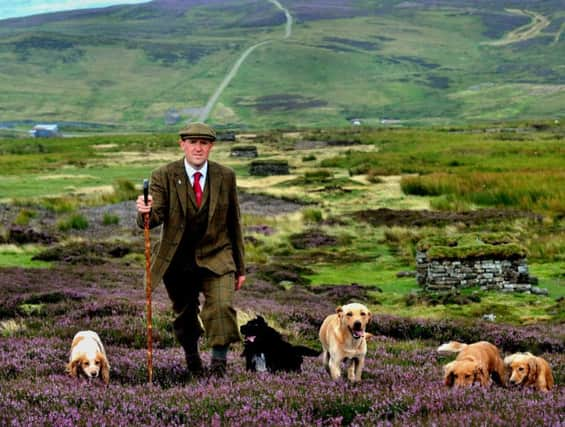Warning volleys fired as war of words erupts over grouse shoot


Some 30 major estates in England received a total of £4.5m last year, up from £4m in 2014, Friends of the Earth said.
The organisation criticised the government for handing out increasing amounts of taxpayers’ money to wealthy landowners and offshore companies in support of what they labelled an “environmentally damaging sport”.
Advertisement
Hide AdAdvertisement
Hide AdHowever, estate owners insisted that at least £1m a week was being invested back into businesses and into local economies across the north.
Earlier this week, it was revealed that estates in three Yorkshire dales were poised to sign long-term environmental management agreements with Natural England that would help conserve upland moorland and accelerate the restoration of peat to store carbon.
The “glorious twelfth” of August heralds the start of the four-month grouse shooting season, which is said to be worth nearly £100m a year to the rural economy, employing thousands and supporting local hotels, shops and garages.
But Friends of the Earth campaigner Guy Shrubsole called on the environment secretary, Michael Gove, to keep his promise to reform farm payments and “force landowners to earn their money”.
Advertisement
Hide AdAdvertisement
Hide AdMr Shrubsole said: “He must stop propping up grouse moor estates and instead fund public goods, like tree-planting, restoring wildlife habitats and flood prevention.”
Amanda Anderson, director of the Moorland Association, which represents 190 grouse moor owners, said: “Our members and sporting tenants invest well over £50m over the course of a year – that’s £1m a week all year round.
“The smallest estate will spend from £70,000 upwards. Businesses that are associated with grouse shooting also benefit very substantially.”
She added: “Roughly £9 out of every 10 is privately funded with the last fraction coming from Common Agricultural Policy support, and these funds are provided to ensure that land is kept in good agricultural heart and delivers specific wildlife and landscape benefits.”
Advertisement
Hide AdAdvertisement
Hide AdGary Doolan, of the British Association for Shooting and Conservation, said grouse shooting also delivered “significant” conservation benefits.
He said: “Heather moorland is rarer than rainforest - 75 per cent is found in Britain because of grouse moor management and up to five times more threatened wading birds are supported on moors managed by gamekeepers.”
The opening of the season has also focused attention on the decline of hen harriers, birds which prey on young grouse chicks.
Conservationists blame falling numbers on persecution by gamekeepers to protect shooting revenues, but the sector insists it wants to work with wildlife organisations to save the species.
Advertisement
Hide AdAdvertisement
Hide AdJeff Knott, head of nature policy at the RSPB, said: “Where moorland management has been intensified to deliver the maximum number of red grouse to be shot, the opportunities for delivering wider public benefits have been reduced,
“We believe a fair set of rules are needed in the form of a licensing system to ensure the driven grouse industry delivers management to the highest standards for the multiple benefits of us all.”
• The unsettled weather since June has dampened prospects for the new shooting season, experts have said.
Benedict Heyes, estate director for the Bolton Abbey grouse moors, which cover 13,500 acres of heather either side of the River Wharfe, said: “It’s not going to be a vintage year. Some areas will be good, some not so good.
Advertisement
Hide AdAdvertisement
Hide Ad“The weather was poor in June just at a critical time when the grouse chicks were hatching, and that would have taken its toll.”
There will be no shooting today on the estate, whose moors are managed to feed into the reservoirs which supply Leeds and Bradford.
“We will probably start shooting next week,” Mr Heyes said. “We’ve certainly got a surplus of grouse to harvest but we’ll get a better idea when we get on to the moors and cover the actual ground.”